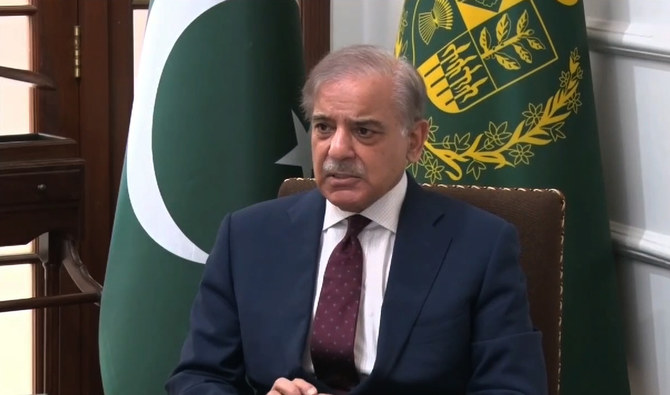ISLAMABAD: Prime Minister Shehbaz Sharif on Sunday ordered upgradation of an existing road network to connect Reko Diq mining project in the country’s southwest to the deep-sea port of Gwadar.
The prime minister gave the instructions while presiding over a meeting in Lahore with regard to mines and minerals in the country’s southwestern Balochistan province. The meeting was also attended by Mark Bristow, chief executive of the Toronto-based firm Barrick Gold Corporation that has been working on the project.
Located in Pakistan’s southwestern Chagai district, Reko Diq contains one of the biggest undeveloped copper and gold deposits in the world, with the potential to produce a large amount of these precious commodities for decades.
During the meeting, PM Sharif stressed the need to benefit from the mineral wealth in Balochistan through comprehensive planning regarding communication infrastructure, including roads and a railway line.
“Upgradation of the existing road network should be done as soon as possible to connect the Reko Diq project with Gwadar,” the prime minister was quoted as saying in a statement issued from his office.
“Wherever new roads are being constructed, their completion should be expedited.”
PM Sharif also directed officials to carve out a strategy regarding feasibility of a railway network from Reko Diq to the Gwadar port.
The Reko Diq project underwent legal and financial disputes, though it is considered highly significant for Pakistan’s mining sector and the broader economy, with the potential to transform the economic landscape of Balochistan and contribute substantially to the country’s overall development.
Separately, Barrick Gold Chief Executive Bristow said the Reko Diq project was “revolutionary” and would change the fate of Balochistan, Pakistan’s largest but most impoverished province, by revolutionizing the local economy, the state-run APP news agency reported.
“An estimated $10 billion would be invested during next eight to nine years, which would boost the mining industry and the local economy,” Bristow was quoted as saying.
He also underscored his company’s commitment to sustainable development, job creation and community empowerment in Balochistan, according to the report.
PM Sharif orders upgradation of road network to link Reko Diq project with Gwadar
https://arab.news/m7bq4
PM Sharif orders upgradation of road network to link Reko Diq project with Gwadar

- Located in Pakistan’s Balochistan, Reko Diq contains one of the biggest undeveloped copper and gold deposits in the world
- PM Sharif stresses need to benefit from mineral wealth in Balochistan through planning regarding communication infrastructure
Pakistan finmin meets venture capital firm Gobi as $50 million tech fund proposed

- Techxila Fund II aims to empower Pakistani startups in fintech, e-commerce, logistics, supply chain sectors
- Finance Minister Muhammad Aurangzeb reaffirms commitment to strengthen venture capital landscape
KARACHI: Finance Minister Muhammad Aurangzeb met a delegation of the global venture capital firm Gobi Partners on Thursday during which it proposed a $50 million tech fund to empower Pakistani startups, the Finance Division said.
Gobi Partners is a prominent Malaysia-based venture capital firm. Founded in 2002, the firm says it has more than $1.6 billion in assets under management and invested in over 400 companies across 16 locations in Asia.
Aurangzeb held a meeting with a high-level Gobi Partners delegation, which included its Chairman Thomas Tsao, Managing Partner Naiel Ikram and Investment Associate Abraiz Abdullah at the Finance Division.
The delegation briefed the finance minister on Gobi’s regional footprint and its investments in Pakistan through the Techxila Fund I, which was launched in 2020 and has supported startups across fintech, e-commerce, and digital infrastructure, the Finance Division said.
“Gobi Partners also shared a plan regarding Techxila Fund II, with a proposed target size of USD 50 million, aimed at investing in high-potential sectors including fintech, logistics, health technology, and software services,” the Finance Division said.
“The firm expressed its intention to anchor the fund with its own capital and mobilize participation from domestic and international institutional investors.”
The Techxila Fund II aims to empower startups in Pakistan as well, focusing on fintech, e-commerce, logistics and supply chain and health tech, according to an earlier statement from Gobi Partners.
Aurangzeb underscored the Pakistani government’s commitment to strengthening its venture capital and innovation landscape, saying it is a part of its broader strategy to promote private sector-led growth, deepen financial markets and support technology-driven economic diversification.
The delegation highlighted the importance of further strengthening the enabling framework for venture capital in Pakistan, the Finance Division said.
“In this regard, they suggested encouraging greater participation by domestic financial institutions in venture capital and private equity, as well as considering tax pass-through status for venture capital and private equity fund investments to facilitate local investor participation,” it added.
The meeting takes place amid Pakistan’s aggressive attempts to increase foreign investment in recent years. The South Asian country has aimed to consolidate recent economic gains such as lower inflation and higher foreign exchange as it targets sustainable economic growth.










